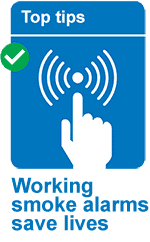This week (14-20 June), Royal Berkshire Fire and Rescue Service (RBFRS) is supporting the National Fire Chiefs Council’s (NFCC) Home Safety Week, encouraging Berkshire residents to ensure that they have enough working smoke alarms in their home.

Statistics show that in 2018/19, 254 fatalities occurred in the UK due to accidental dwelling fires. In 18% of accidental dwelling fires in England, the smoke alarm failed to operate. 50% of these failures were caused by the smoke not reaching the alarm or the area not being covered by the detector.
Smoke alarms save lives if they are installed and maintained correctly. Residents can follow some simple safety advice in order to reduce the chance of their smoke alarm failing to operate in an emergency:
- Install additional smoke alarms where there are electrical appliances and near sleeping areas.
- Install at least one smoke alarm on each level of your home.
- Test all your alarms at least weekly to ensure they are working.
- Alarms don’t last forever – check what type of alarm you have and replace them accordingly. This could be every year or every 10 years.
- If you can, interlink the alarms in your home.
Residents are also encouraged to install a carbon monoxide (CO) alarm in their home. CO is a highly poisonous gas, which you cannot see, taste or smell. It is recommended that any room with a fuel-burning appliance such as an open fire, wood-burning stove or gas appliances such as a boiler or cooker should have a working CO alarm fitted.
Gail Muirhead, West Hub Prevention Manager, said: “As part of Home Safety Week, we are strongly advising our residents to fit working smoke alarms on every floor of their home as well as a carbon monoxide alarm in any room that has a fuel-burning appliance. It is important to test your smoke alarms every week, as working smoke alarms can give an early warning and save lives.
“However, the best way to keep yourself safe is to prevent an incident from happening in the first place. That’s why we are encouraging everyone to take extra care in their home by following our home safety advice.”
More people die in fires in the home caused by cigarettes or smoking products than any other cause. We’re urging residents who do smoke in the home to ensure that any smoking products are fully extinguished. Never smoke in bed and take care when tired too – it’s very easy to fall asleep while a cigarette is still burning and set furniture alight.
Take care if using emollient creams as well, as research from the NFCC shows that both paraffin and non-paraffin emollients can act as an accelerant when absorbed into clothing or bedding and exposed to naked flames or other heat sources.
To help prevent a fire from starting in the first place, there are some simple tips to help residents stay safe from a fire in the home:
- Plan an emergency escape route, and practise it with everyone you live with.
- Switch off appliances at the plug where possible before you go to bed.
- Don’t leave appliances such as dishwashers and washing machines running overnight or when the house is empty.
- If you have a recalled appliance – don’t risk it, stop using it. Register your appliance at registermyappliance.org.uk for the latest recall information.
- Good housekeeping, like keeping ovens and filters clean, can prolong the life of an appliance and reduce the risk of fire.
- Check with older relatives, friends and neighbours as they may need help testing their smoke alarms.
- In the event of a fire, get out, stay out and call 999.
For more home safety advice, visit Safety at Home on the RBFRS website.